The Mycelium of Memory
The announcement comes over the intercom as I am spelling out words at my desk. Or it is a math quiz. Or it is a blank paper. I am in the front row of the classroom and when the principal’s voice comes pinging into the room I stare up at the bright yellow and royal blue borders that adorn the bulletin boards. Her name is Mrs. Jones. I put my pencil down because everyone must pay attention when the principal speaks.
“There has been an attack against the United States,” Mrs. Jones says.
The pencil on my desk has absurd ridges, and I feel them with my fingertips. Metal and rubber and wood are all tastes my tongue knows. I put the pencil in my mouth.
The teacher rolls in a boxy TV on a tall metal cart and we watch the towers smoking. This does not happen, but the images of the towers smoking, of the planes crashing into the buildings, of the towers falling inundate the media for the weeks to follow. It drenches the surrounding time and leaves imposing stains. Many of my memories hold metal shrapnel and ash.
My memories of that time also contain Tyler. We are friends when the towers fall. He is the boy who lives down the street. Friends well before; for as long as I can remember. In the spring he plays baseball; I played soccer once in kindergarten but was too shy to take the field. We play whiffle ball in the gas line easement across the street from my house or in an imagined triangle in his backyard. I am a year older, but I happily do whatever he says. There is a hierarchy to our friendship, and my role is the slavish sidekick, servile, always with a yes on my tongue. I am a mother doting on my child, attending, supporting, yielding. He is spoiled and easily riled. I do everything I can to keep him appeased.
We play videogames together in his basement and mine. We have Nintendo 64s and we play Diddy Kong Racing and Mario Cart 64, blast each other with egg-shooting birds on Banjo-Tooie. We ride bikes through the neighborhood, pass through the forested short-cut, and buy sodas from the Wal-Mart vending machines. A friendship large like skyscrapers, encompassing my childhood; monolith never expecting crash.
Introduction to Life Simulation
In 2002, I live with a purple Nintendo Gamecube controller in my hand. Nine years old and one year into the post-9/11 world my mom buys my brothers and me a copy of Animal Crossing. It comes out just four days after 9/11 in Japan, but it doesn’t hit US shelves until the next year.
On the front of the box, there is a two-story house: animals lean out of each window waving, and a human pops out of the front door. A sign above the house reads: Welcome to Animal Crossing. Inside, there is the small Gamecube disk and a limited-edition memory card with a sweater-clad cat.
Animal Crossing is a life simulation game. You are a human who moves to a new village populated by humanoid animals. You buy a house on loan and pay it back slowly. You can chat with your neighbors and do favors for them. You can collect shells, furniture, fossils, fish, bugs, paintings. There are special visitors who come every week. The seasons change: it rains, it snows, the trees bloom pink in spring. There are things to do—almost an infinity of them.
It is a single-player game, so my brothers and I have to split our playtime. One person plays while the others watch with varying degrees of impatience. Our mom bequeaths her stove timer for the purpose of resolving any disputes.
In the town I share with my twin brother Jared, I make a male character named Justin and choose the house with the yellow roof for him. The male characters wear round hats with horns coming out the sides. The hats change color and design to match the shirt you wear. Justin likes to collect fossils and display them in his house. He also likes the Spooky Series (a matching, pumpkin-themed furniture set, carpet, and wall paper), the Blue Series, and fruit-shaped furniture.
The first memory card I own for myself, I make another Animal Crossing town and populate it with all female characters: Hannah, Lily, and Anne. The women’s hats are conical like a princess’s costume prop. They have round brown eyes with long lower lashes or sparkly black eyes with wingtip lashes. They love the Citrus Set, tulip chairs, fish from dainty pop-eyed goldfish to giant coelacanths, and the Green Series with its cute check patterns. For all the characters I restart the facial feature selection process until their eyes and faces are just right. I want them to perfectly embody me. I love being all of them, though Hannah is my favorite.
Tyler also has Animal Crossing and my brother, Jared, and I go to his house and play in rotating shifts. There are some in-game NES consoles that can be played with two players, and we switch between the three of us. Or, sometimes, it is just me and him and we switch on and off. I like to be helpful. I clean his room once while he fishes in the large, river-fed pond, imagining that I am cleaning up an Animal Crossing house.
His mom comes downstairs and sees the cleaned room and gives me a complimenting smile. “Wow, what a good friend!” she says. She is always friendly, and I want her approval. “I could sure use your help around here.”
I want to be her perfect son. Her perfect daughter. The perfect child.
We plant flowers. We swap fruit. We sail to a tropical island on the dingy of a crusty sea turtle.
I am so excited for life. There are no ash clouds. There are no towers falling. I spend summers playing how I want to live.
Animal Years
I tell myself I am a red snapper aficionado. Jared rolls his eyes. I fish five of the seven fish out of the ocean against the algorithms’ odds. They are worth 3000 bells a piece. I collect gyroids, K.K. Slider songs, fossils I have dug from the star-shaped marks in the ground. My most prized possessions are my collection of turkey-themed furniture with matching wallpaper and carpet.
I spend hours a day during the summer playing Animal Crossing. There are bugs to catch, rare clothes and art to fill wardrobes. The kitchen timer goes by the wayside. I spend three hours hounding the neighbors for favors to do, I clean out the town dump, check the lost and found at the police station, sell fruit and shells. I walk around and around with nothing to do. My eyes ache from the brightness of the screen. The timer’s beeped three times, but I refuse to forfeit my controller.
The September 11 attacks change things before I know any different. A disparity between the life simulated in Animal Crossing and the life represented on TV begins to open. Years pass and the United States begins undeclared wars against countries in the Middle East. My oldest brother starts locking his things away behind a closed bedroom door. He is diagnosed in the 99th percentile for anxiety, something my parents say I must never speak of. We are all uncertain. I begin to quiet. There are mechanisms in my life that are moving beyond my comprehension and control. But, being a simple, quiet cog is manageable, expected. It is easier for everyone.
Around this time, Animal Crossing codes begin appearing in issues of Nintendo Power which my oldest brother has a subscription to. The codes unlock exclusive Mario-themed furniture décor. But neither Jared nor I is allowed to bother him in the slightest. And we are definitely not allowed to go in his room.
The call of the codes is too alluring. From reconnaissance I know he keeps his Nintendo Power magazines in the bottom of his closet. I wait until he is playing videogames downstairs and my parents are not lurking about to sneak into his room and prowl through the pages.
His room is dark with the blinds drawn during the afternoon. On the walls is a constellation wallpaper. I creep across the dark wood floorboards, halting when one creaks. The closet doors open like theatre curtains. On the floor, there are a few magazine organizers. I sift through the magazines with a constant eye on the door. The codes section is toward the back and I look for the familiar yellow text box. The first magazine is one I have already harvested the code from. The next one, too. I fumble through them, heartbeat racing, the breath caught in my throat. I find the latest magazine with a brand new code. I print the letters and numbers plainly on yellow, lined paper. With the secrets in hand, I sneak out and close the door behind me.
Later Jared and I take turns unlocking items from Tom Nook.
Tom Nook says: “Then tell me the password.”
I whisper the tedious codes to Nook, twenty-eight characters each.
“I see, I see,” he says.
Out of his pocket he pulls wrapped presents and passes them to me. The small boxes contain impossible wonders: huge flagpoles, glowing stars, fire flowers, coin blocks, bullet bill cannons.
After we claim our prizes we destroy the codes, tearing them into tiny pieces.
The US declares war in Iraq. I wonder if it will still be going on when I am old enough to be drafted, if I will have to kill people, if I will be killed. I am not aware enough to wonder about the people who have already been killed by military action so far away from the stability of Kentucky. Thousands of civilians killed in countries that, in my ignorance, I can’t even find on a map as life carries on here just the same.
The Infinity Pocket
Your pockets store a ridiculous quantity of items in Animal Crossing. You can carry thirty six-foot long living coelacanths or thirty ebony grand pianos or thirty four-poster beds. The pocket is a mysterious place. You walk around with tons of items without any sign of distress. When you put anything in your pocket it transfigures into a green leaf.
You can mail impractical items in envelopes, too. If you want you can slide a fishing rod or a pink kitchenette into a standard envelope and mail it to your neighbor.
The media reports that the United States is at war, but not officially. It is Afghanistan. It is Iraq. It is whatever country, whatever group we are fighting. It is a fierce debate what we are fighting for. In the eighth grade, our parents have to sign a permission slip so that we can watch a documentary on 9/11. We sit in the classroom, gathered around a TV on a metal cart.
I remember clearly the pixilated blobs tumbling out of the building, down and down. I see the hovering bodies stuck mid-plunge, their faces obscured, choked with smoke, flushed suddenly with all of that fresh, breathtaking air. The Falling Man appears, their human body signing a four or a nine. The body has a mouth with a voice lost in vacuity of falling.
Tyler has a friend who lives at the end of his street named Hussain who we play with sometimes and ride bikes with on his street. His family is the only Muslim family I know living in our neighborhood. On Halloweens, they have their front porch light on, but on their door they have a sign explaining that they are a Muslim family and that they do not celebrate Halloween. The Halloweens after 9/11 their front porch light is never on. Hussain never comes to play at Tyler’s house. Their entire family retreats as if into the infinity pocket. I imagine now the fear they must have felt in the sea of white faces. And I, a white child, fail to ask a single question. I recognize now the privilege and racism holding my tongue. Silence is a complex, intersectional language that reflects dynamics of power. Already I knew the weight of silence, but to the detriment of those around me I hadn’t realized how I too could wield absences of sound.
Tyler and I never talk about Hussain. We never speak about 9/11 or the war or what the United States is doing to countries in the Middle East. In Animal Crossing, I start a campaign against Dotty, a rabbit who wears a blue check dress. She is programmed to have a peppy attitude, and I have tired of her constant positive vibes. I wield an axe and approach Dotty. Tyler is there, next to me, watching. I go up to her and press the A button, hoping to swing. The game initiates a conversation instead. I try again and again. I just keep talking to Dotty, hearing her inane catchphrase: wee one. “I’ve seen you a lot today, wee one!”
I try other implements. The fishing rod, the shovel. Finally, I try the net. I sprint toward Dotty and fire the A button. The net falls, clunking Dotty in the face. Her eyes widen as if she has been caught off guard. Tyler laughs at the ingenuity of this tactic. The approval invigorates me. I do it again and again. After the third time, Dotty becomes sad and dark clouds crowd her skull. I want her to move out, I want her to be sad. But I am also scared. Who am I trying to imitate? Tyler’s approval in this act unnerves me.
This is a life simulation. The worst you can do is bonk your neighbors on the head with a net, but in real life there are no limitations to suffering.
There are things concealed in my pockets I do not want to touch. I do not want to contemplate the edges of the dark leaves lurking; I do not want to uncover profane items I cannot display in my house or sell to Tom Nook.
What is a human capable of carrying within them without someone noticing? Our pockets are deep. Our feelings are a torrent of green leaves. All of this baggage is so inexplicably light.
The Cost of Wishes
The waters of the Animal Crossing Wishing Well reflect my face. I am sitting on the cool flagstones in the town square, peering into the water. The face floating on the surface of the water is mine, but from when I do not know. It is shifting from me at twenty-three recovering from years of awful buzz cuts to me at eight clutching my stuffed pikachu to me at twelve with a mouth sewn shut with a bitter thread. The great tree behind the Well rustles quietly in a dark breeze. It is night, a full moon.
I am here to apologize to the Well and to ask it for forgiveness. I do not have an undeliverable item as is required by the program. I am here to apologize to the twelve-year-old me for delivering a story I promised never to tell.
In the Well is my reflection. The water obliterates the face. Always it appears an unrecognizable smear. I remember what they wanted. They wanted to be a masculine little boy—they feel the safety of it now. They know inherently it will protect them.
The moon hangs in the Well alongside spent-coin wishes and an old reflection with bubbles streaming from deep below the water and a living body staring up with wobbling, wide eyes.
Placing my hands in the Well, I reach down to you, Justin. At the bottom of the Well, you hope the darkness of the night and the water will protect your story. You have yet to learn that even silence has a language to tell its story.
Obsession
Animal Crossing is a life simulation game where there is always something to do. But after playing for three hours straight, seven days a week for a year and a half, the neighbors repeat their programmed lines. The fruit and the fish are sold. My house is redecorated and all the items in Tom Nook’s store are bought. There is nothing to do.
I have a vision of an Animal Crossing avatar standing in the middle of an acre with nothing to do, nothing to say. Every task and chore has been resolved. The avatar stands there, holding its breath. There is no need to breathe in a life simulation.
I start playing other games with Tyler. We fall heavily into Phantasy Star Online: Episodes 1 & 2. It is a completely customizable RPG with different classes of humans and androids in which you can select clothing, facial features, hair, and more. We replay the levels again and again, playing through Hard Mode, Very Hard Mode, and eventually, our crowning achievement, Ultimate Mode. I have two characters: Zelda, a FOmarl female wizard with a blue dress and long brown hair I eventually dye blonde, and Robot Version 2.0, a HUcaseal who is a tiny female android with a mighty purple body. She wields scythes and blades twice her size. Zelda is the perfect support unit who also has well-rounded weapons. Robot Version 2.0 is of the Hunter class and, being a robot, she cannot cast spells to help her team out. She dives singularly into the fray, dealing massive damage, taking devastating hits.
Something begins to shift in the dynamic between Tyler and Jared and me. He has hit us before, has yelled at us in anger. It has been our responsibility not to make him mad, not to win too many times in video games, to accept whatever he says to us without response or critique, to acquiesce. We are older; we have to be more mature. We are part of this world of anxiety, paranoia, war, and rhetoric of violence and we seek understanding for Tyler’s behavior. His tempestuousness must fit somewhere in this unrest. And if we just stay silent, the violence will stay far-off.
The eggshells we’d been tip-toeing around are all broken. Our bodies are beginning to change. Tyler demands more attention from Jared and me, but he plays Runescape and Maple Story for hours while we stare mechanically at a board game spread on the floor of his family’s computer room with sparse rotations.
Tyler’s brother is throwing balls at us while we ride bikes in my driveway, and we are throwing them back at him and at each other. We pedal away to go to Tyler’s house. I drop a ball that I’m holding, and Tyler runs over it on his bike. When I turn around, he is on the ground crying. His arm is broken. “Maybe it’s not broken,” he says through the tears. But it is swelling, and I know it is. He gets a blue cast put on it and says time and time again that we broke his arm and when he and I are alone that I broke his arm.
Tyler’s mom brings him takeout for dinner while we are playing in his basement. He thrusts his food into my hands to hold while he fishes in the paper bag for napkins. I am hungry. His dog, who I thought was outside, is too. She jumps up into the air from behind and gulps down a portion of the quesadilla. He punches me hard in the side of the head, demanding to know how I could have let that happen. I want to cry, but I can’t in front of Tyler, so I turn my head down and mutter some apology.
We are playing whiffle ball in Tyler’s backyard. His brother pitches hard and beans Jared in the eye with the ball. Jared drops the bat and begins to run home, crying. Tyler tells him to come back, that it’s not that big a deal, that it doesn’t hurt that bad, that he shouldn’t be a baby, a pansy. I run home after Jared, and Tyler and his brother follow and stand in our front yard saying they’re sorry, saying it won’t happen again, saying it was an accident, saying that it wasn’t that bad, saying we just need to come back. I hide in the house and don’t answer the door.
You Cannot Reset
Tyler moves his bedroom into the basement of his house so that he and his brother can have separate rooms. We are all getting older now and need privacy. I have to share a room with Jared so I am jealous. There is nowhere else in our house for us to sleep. Tyler has his own light wood furniture and a TV of his own. We play video games sitting on his bed.
Sometime after Jared and I have harvested all the Super Mario codes, I bring my memory card over to Tyler’s house and we sit in the basement, and I show him my Animal Crossing treasures.
He loves them. He wants them, too. He asks how I got them.
“I got the codes from my brother’s Nintendo Power magazines. I had to steal them.”
“Hey, I want them, too.”
I don’t want to upset him. But the codes are gone. Shredded up. My oldest brother has stepped up security. The last time he found me in his room, he chased me out and kicked me senseless on the floor.
“I don’t have them anymore. Jared and I got rid of them.”
“C’mon, I know you’ve still got them,” Tyler says. “Give me the codes.”
I am speechless. What else can I say? The codes are twenty-eight characters long: I don’t remember any of them let alone more than a dozen. I spent hours stealing them from my brother. I am not about to repeat that process.
Tyler views this silence as insubordination. “What do you want for them? Huh? What do you want?”
He is too physically near, so I shift away.
He punches me in the arm, grabs at my shoulder. I stand up to leave, and he pushes me. I turn in the air and land on my back. The back of my head hits the ground. I try to stand.
He pushes me to the ground again. “Is this what you want, huh? Is this what you want?”
He pulls down the front of his pants by the waistband, exposing himself repeatedly. The shorts are blue or red or white. I am scared. I do not know anything about my body. I have brought this upon myself. My head hurts from the impact with the ground.
“Huh? Is this what you want?”
If you reset without saving in Animal Crossing, you are punished the next time you play. Mr. Resetti, the vitriolic mole, springs from the ground as soon as you exit your house and berates you for irresponsibly resetting without saving. If you reset too often, he takes away your money and later he strips away your eyes and mouth leaving gaping holes where your features used to be.
I am begging for him to stop. To let me go. The wood paneling on the basement walls is dark. The carpet is white and thin. “You’re hurting me,” I say. “You’re hurting me.” The back of my head vibrates. He steps back for a moment, and I am up and scrambling, darting past his grasp, up the stairs. His mom is in the kitchen preparing a snack. I shove my shoes onto my feet, huddled by the backdoor. She says something to me, but how can I respond? I run all the way home and say nothing.
I do not think about this event. The blank space of my mind is where I place every failure I feel I made in our friendship. Every issue I have instigated.
I am his friend, silently, for two more years. Then I stop trying all together, and I let the phone calls ring when I see his number on the caller ID.
In the weeks after, before I blot the event out completely, I wonder if he would have done this to anyone else. Members of his baseball team? His brother? I am not certain. Did he recognize the subtle dissonance in my presentation way back before even I knew? Something he could comfortably victimize?
I try to reset that afternoon for a decade in my head. But Animal Crossing is a life simulation. You are conditioned not to reset. There are things that cannot be undone. Navigating the immutable programming of the past, you must adhere to the limitations of the coding.
Mr. Resetti is always there, wating, face red, ready to yell. Ready to take away my mouth.
Credits Roll
I go to school. I sit at my desk I take notes. I study. I don’t study. I smile. I deserved it. I am quiet. I am loud. I eat quietly at dinner. I am changing. I get detention and conduct referrals. I forget, I say. I deserved it. I feel my parents cannot handle what has happened—they have so many other things to worry about. I am something they do not understand now. I must be their normal child. Their child without problems. The one they confide in. I deserved it. I start running track and cross-country at school. The miles wear down my mind. My body. I deserved it, but it is forgotten, I say. I forget.
How could I be so silent?
It is strength.
It is shame.
It is incredible, incredible naivety.
Time-Travel to the Beyond
In Animal Crossing, it is 31 December 2030. I have started time-traveling, passing through multiple days in a matter of hours, mining them for their valuable interactions. Check out the furniture in Nook’s shop, scour the land and seas for fish and bugs, fossils. Track the special visitors. And then I move on to the next day. It is life in fast-forward. Days and weeks passing by in the span of an afternoon.
In this scope, life is full, teeming, hectic, demanding. The town is overrun by weeds. The villagers count the days since I last spoke to them, yellow waves of shock springing from their heads when I speak to them. It is easy to brush past them.
Peaceful, busy day after peaceful, busy day.
If life is boring, skip forward. If you need money, skip forward to summer when the bugs and fish are plentiful. If you start to think too much, skip forward and chase the next exciting thing. If you want special furniture, skip to holidays. If you want to celebrate your birthday, skip to your birthday. Celebrate decades of your birthdays. Celebrate the same birthday time and time again.
If you want a neighbor to disappear, skip forward years without speaking to them until they move out.
Open up their goodbye letter.
Do not read it.
Shred it quietly between your fingers.
Animal Crossing is a life simulation, but it is not. Under such pressure, the game falls apart, becomes tedious. I skip to 31 December 2030 because it is the last day Animal Crossing is programmed to simulate. I watch the game clock tick toward the New Year, closer and closer to the great mystery of the beyond.
What will happen on the last day when the fireworks go off? I survived Y2K. I have lived in the post-9/11 United States of America. I am paranoid. The animal neighbors are all gathered together, singing, smiling. They are either unfazed by their impending doom or unware of it. Life, even in simulation, can be cruel.
The bell rings, the announcement is made, the fireworks boom. The clock shockingly reads: 1 January 2031. Is this an unprogrammed continuation? I am amazed that something exists after.
The air is full of smoke. Tiny embers and ash flutter down. The fireworks cease. The game becomes a wintered quiet. I shrug and save the file. I open it up again. The clock reads 1 January 2030. A reset. This is the farthest extent I can run. There is no more time.
I will have to live this year again and again and again.







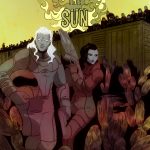
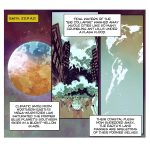
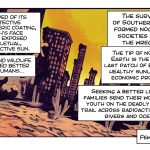
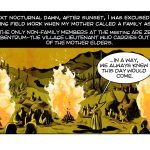
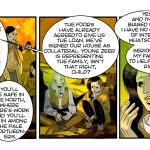
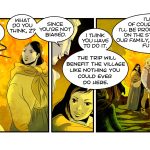
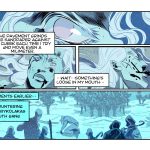
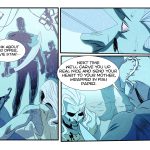
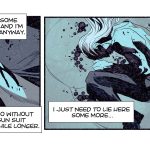
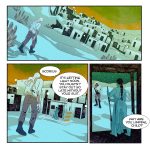
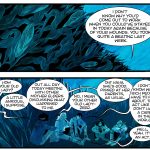
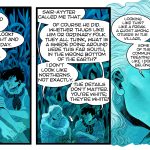
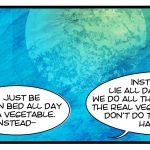
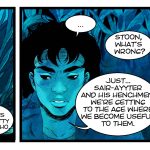
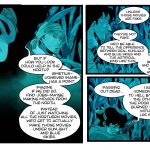

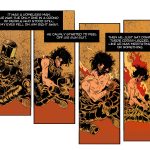
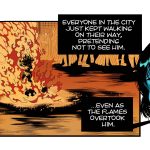
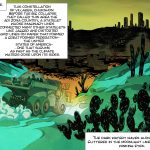
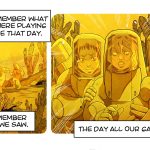
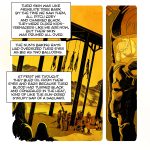
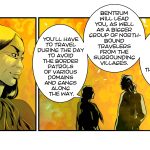
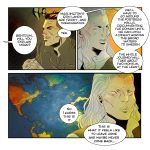
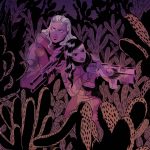








![Cover of Danez Smith's [insert] boy](https://cah.ucf.edu/floridareview/wp-content/uploads/sites/34/2018/09/cover-of-Danez-Smiths-Insert-Boy-257x300.jpg)




